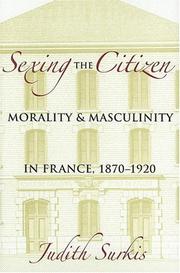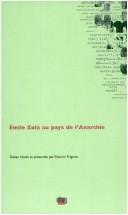| Listing 1 - 2 of 2 |
Sort by
|

ISBN: 0801444640 9780801444647 0801477220 1501729993 Year: 2018 Publisher: Ithaca, NY : Cornell University Press,
Abstract | Keywords | Export | Availability | Bookmark
 Loading...
Loading...Choose an application
- Reference Manager
- EndNote
- RefWorks (Direct export to RefWorks)
How did marriage come to be seen as the foundation and guarantee of social stability in Third Republic France? In Sexing the Citizen, Judith Surkis shows how masculine sexuality became central to the making of a republican social order. Marriage, Surkis argues, affirmed the citizen's masculinity, while also containing and controlling his desires. This ideal offered a specific response to the problems-individualism, democratization, and rapid technological and social change-associated with France's modernity. This rich, wide-ranging cultural and intellectual history provides important new insights into how concerns about sexuality shaped the Third Republic's pedagogical projects. Educators, political reformers, novelists, academics, and medical professionals enshrined marriage as the key to eliminating the risks of social and sexual deviance posed by men-especially adolescents, bachelors, bureaucrats, soldiers, and colonial subjects. Debates on education reform and venereal disease reveal how seriously the social policies of the Third Republic took the need to control the unstable aspects of male sexuality. Surkis's compelling analyses of republican moral philosophy and Emile Durkheim's sociology illustrate the cultural weight of these concerns and provide an original account of modern French thinking about society. More broadly, Sexing the Citizen illuminates how sexual norms continue to shape the meaning of citizenship.
Masculinity --- Marriage --- Sex role --- Citizenship --- Masculinité --- Mariage --- Rôle selon le sexe --- Nationalité --- Political aspects --- History. --- Moral and ethical aspects --- Aspect politique --- Histoire --- Aspect moral --- France --- History --- Masculinité --- Rôle selon le sexe --- Nationalité --- Gender role --- Sex (Psychology) --- Sex differences (Psychology) --- Social role --- Gender expression --- Sexism --- Masculinity (Psychology) --- Men --- Married life --- Matrimony --- Nuptiality --- Wedlock --- Love --- Sacraments --- Betrothal --- Courtship --- Families --- Home --- Honeymoons --- Birthright citizenship --- Citizenship (International law) --- National citizenship --- Nationality (Citizenship) --- Political science --- Public law --- Allegiance --- Civics --- Domicile --- Political rights --- Moral and ethical aspects&delete& --- Political aspects&delete& --- Law and legislation --- Third Republic, 1870-1940 --- Masculinity - Political aspects - France - History --- Masculinity - Moral and ethical aspects - France - History --- Marriage - Political aspects - France - History --- Marriage - Moral and ethical aspects - France - History --- Sex role - Political aspects - France - History --- Sex role - Moral and ethical aspects - France - History --- Citizenship - France - History --- France - History - Third Republic, 1870-1940 --- Gender roles --- Gendered role --- Gendered roles --- Role, Gender --- Role, Gendered --- Role, Sex --- Roles, Gender --- Roles, Gendered --- Roles, Sex --- Sex roles


ISBN: 2843100852 9782843100857 2377471013 Year: 2018 Volume: *9 Publisher: Grenoble : UGA Éditions,
Abstract | Keywords | Export | Availability | Bookmark
 Loading...
Loading...Choose an application
- Reference Manager
- EndNote
- RefWorks (Direct export to RefWorks)
La vie et la carrière d'Émile Zola, intellectuel public par excellence, ont été suivies avec un mélange de fascination et de méfiance par les militants anarchistes de son temps. Des grands succès romanesques à l'affaire Dreyfus, et de là jusqu'à sa mort imprévue, son parcours a été commenté, critiqué, admiré, par ces révolutionnaires intransigeants qui auraient aimé pouvoir compter sur un écrivain célèbre parmi les fervents de leur cause. Cet ouvrage propose vingt-six articles parus dans la presse libertaire, précédés d'une étude historique, qui nous renvoient l'image d'un autre Zola que celui qui nous a été légué par l'histoire littéraire. Un Zola plus grand dans les défauts comme dans les qualités, un Zola tel qu'on a pu le lire, tel qu'on a pu le voir, le connaître, dans bien des cas lui parler, l'entendre. Un Zola tel qu'on a su l'imaginer et aussi un Zola qui a existé, à côté des autres qu'on connaît ou qu'on croyait connaître. Une autre Vérité qui est, elle aussi, en marche.
Zola, Emile, --- Politics and literature --- History --- Zola, Émile, --- Dreyfus, Alfred, --- Contemporaries --- Political and social views --- France --- Politics and government --- Politique et littérature --- Et l'anarchisme --- Appréciation --- Dans la presse --- Critique et interprétation --- Zola, Émile, --- Cholla, --- Emilisōlā, --- Jolla, --- Sōlā, Emili, --- Tso-la, --- Tso, La, --- Zola, --- Zola, Emil, --- Zola, Émile Édouard Charles Antoine, --- Zola, Emilio, --- Zolah, Emil, --- Zoli︠a︡, Ėmilʹ, --- Zuo, La, --- Zuola, --- Золя, Эмиль, --- זאלא, עמיל --- זאלא, עמיל, --- זאליא, ע. --- זאליא, עמיל --- זולא, אמיל, --- זולא, עמיל --- זולה, אמיל --- זולה, אמיל, --- Draifus, Alfred, --- Drayfūs, Alfrīd, --- Drīfūs, Alfrīd, --- Dreĭfus, Alifred, --- Dreĭfus, Alʹfred, --- Dreyfus, Alfredo, --- דרייפוס, אלפרד --- דרייפוס, אלפרד, --- דרייפוס, אלפרעד, --- דרײפוס, אלפרד, --- Contemporaries. --- Political and social views. --- Dreyfus, Alfred --- Politics and literature - France - History - 19th century --- Zola, Émile, - 1840-1902 - Contemporaries --- Zola, Émile, - 1840-1902 - Political and social views --- Dreyfus, Alfred, - 1859-1935 --- France - Politics and government - 1870-1940 --- intellectuel --- histoire littéraire --- affaire Dreyfus --- naturalisme --- Zola, Émile, - 1840-1902
| Listing 1 - 2 of 2 |
Sort by
|

 Search
Search Feedback
Feedback About
About Help
Help News
News